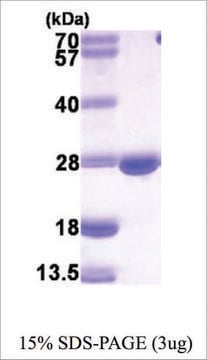T3125
Tetrahydrofolic acid
≥65% (when packaged), powder
Synonym(s):
5,6,7,8-Tetrahydropteroyl-L-glutamic acid, THF
About This Item
Recommended Products
form
powder
Quality Level
concentration
≥65% (when packaged)
color
faintly yellow to light brown
storage temp.
−20°C
SMILES string
NC1=NC2=C(NC(CNc3ccc(cc3)C(=O)N[C@@H](CCC(O)=O)C(O)=O)CN2)C(=O)N1
InChI
1S/C19H23N7O6/c20-19-25-15-14(17(30)26-19)23-11(8-22-15)7-21-10-3-1-9(2-4-10)16(29)24-12(18(31)32)5-6-13(27)28/h1-4,11-12,21,23H,5-8H2,(H,24,29)(H,27,28)(H,31,32)(H4,20,22,25,26,30)/t11?,12-/m0/s1
InChI key
MSTNYGQPCMXVAQ-KIYNQFGBSA-N
Looking for similar products? Visit Product Comparison Guide
Application
Biochem/physiol Actions
Packaging
Storage Class
11 - Combustible Solids
wgk_germany
WGK 3
flash_point_f
Not applicable
flash_point_c
Not applicable
ppe
Eyeshields, Gloves, type N95 (US)
Certificates of Analysis (COA)
Search for Certificates of Analysis (COA) by entering the products Lot/Batch Number. Lot and Batch Numbers can be found on a product’s label following the words ‘Lot’ or ‘Batch’.
Already Own This Product?
Find documentation for the products that you have recently purchased in the Document Library.
Customers Also Viewed
Articles
Cancer research innovations address the complexity of the disease, providing advanced technologies for varied applications.
Biofiles reviews innovative technologies for cancer research, reflecting the complexity of the disease.
Our team of scientists has experience in all areas of research including Life Science, Material Science, Chemical Synthesis, Chromatography, Analytical and many others.
Contact Technical Service










